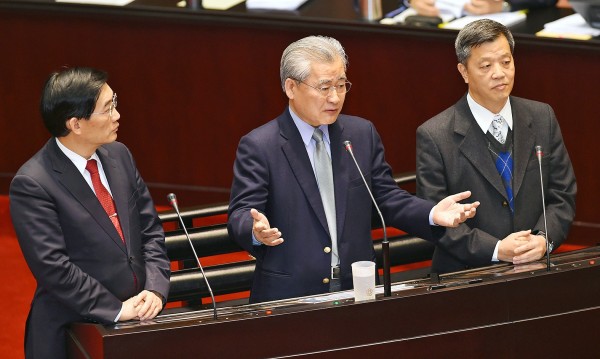《TAIPEI TIMES 焦點》 DPP officials pan KMT pay raise plan

Premier Mao Chi-kuo, center, yesterday said that civil servants would not receive pay raises until wage increases were implemented for employees of private enterprises. Photo: Taipei Times
‘FOUR LAWS FOR PAY RAISE’: Premier Mao Chi-kuo said the spirit of the proposed amendments focus on the importance of ‘improving the treatment’ of employees
By Alison Hsiao / Staff reporter
Premier Mao Chi-kuo (毛治國) yesterday said that civil servants would not receive pay raises until wage increases were implemented for employees of private enterprises, which the government is encouraging by putting forward amendments to four related laws.
A 3 percent pay raise for civil servants, including military personnel and public school teachers, was proposed by Chinese Nationalist Party (KMT) Legislator Liao Cheng-ching (廖正井) last week, who said that the raise would in turn encourage wage increases in the private sector.
When questioned yesterday by Democratic Progressive Party (DDP) Legislator Gao Jyh-peng (高志鵬) on the legislative floor, Mao said that he has never endorsed Liao’s suggestion.
“My view is that it should be the other way around; if a general raise is evident in the private sector, civil servants should be getting a raise too,” Mao said.
Minister of Economic Affairs John Deng (鄧振中) said that “there is no necessary correlation between raises in the two spheres.”
KMT Legislator Chiang Nai-hsin (蔣乃辛), citing government statistics, said that after the 3 percent pay raise for civil servants in 2011, “merely 21.8 percent of the companies made upward adjustments to their employees’ salaries, and the percentages were even lower in the following years, with 15.8 percent in 2012 and 18.8 percent in 2013.”
On the other hand, “the monthly increase in enterprises’ average retained earnings last year [as of September] was NT$74.2 billion [US$2.35 billion], an increase of 1.3 percent from the previous year,” Chiang said, adding that “ none of the earnings were used for investment or pay raises.”
Chiang questioned the possible effect on wages of the KMT caucus’ proposed amendments to the four related laws endorsed by the Executive Yuan.
The KMT caucus has called for amendments to the Company Act (公司法), the Labor Standards Act (勞動基準法), the Small and Medium Enterprises Development Act (中小企業發展條例) and the Factory Act (工廠法) — dubbed “four laws for pay raises” — that involve requiring enterprises to dole out their surpluses to employees as raises and bonuses.
If implemented, companies could be rewarded with tax credits, or be fined if not.
Apart from DPP lawmakers’ reservations about using tax credits as an incentive, considering it eroding state coffers and running afoul of the idea of social fairness, Chiang yesterday said that the effects might be limited as they “could not solve the wealth gap issue.”
Mao said the wealth distribution problem is a global issue, “which reflects the fact that it is time for traditional capitalism to make changes, and Taiwan is taking the first step by proposing that companies distribute surplus revenue to their workers.”
“The essence of the ‘four laws for pay raises’ lies in its spirit, which centers on companies improving the treatment of their employees, who they should treat as assets and partners, instead of only focusing on customers and shareholders,” Mao said.
Gao questioned the Executive Yuan’s determination to reform the national retirement pension program, the taskforce office of which — according to a report in the Liberty Times (the Taipei Times’ sister paper) — has been disbanded “without a sound.”
President Ma Ying-jeou (馬英九) in 2012 announced his intention to reform the retirement pension program, but no meetings have been called since the beginning of Mao’s term as vice premier, the report said, adding that Mao was accountable for convening the taskforce, and that it has been more than one-and-a-half years since the last meeting was convened.
Mao said that the reform, contrary to media reports, “remains on top of the government’s agenda, and the function of the cross-ministerial taskforce was simply proposal integration.”
While Mao added that the government has been communicating with legislators regarding a possible rollout, Gao and other opposition lawmakers said that no action had been taken by the Executive Yuan.
新聞來源:TAIPEI TIMES

















